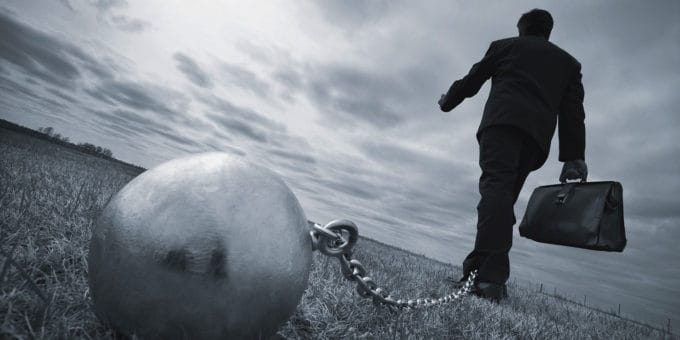Are company directors liable for the debts of the company? We explain the circumstances where directors of a limited company can be held responsible for its debts.
While setting up a limited company entails a bit more in the way of formation than being a sole trader, as well as greater financial and admin responsibilities, there are certain advantages – one of which is ‘limited liability’.
Key Takeaways
- Directors can become personally liable for company debts if they engage in wrongful or fraudulent trading practices.
- Overdrawn director’s loan accounts can lead to personal liability, especially during insolvency proceedings.
- Maintaining open communication with creditors helps reduce the risk of personal liability for company debts.
As the name suggests, any liabilities of a limited company generally do not extend beyond the entity of the company itself. However, although shareholders are generally always protected from liabilities (aside from rare cases where courts decide to “pierce the corporate veil”), directors (who are often also shareholders) can sometimes become personally liable for company debts.
What is liability?
In a nutshell, this is any sum of money or debt owed by a company. It could be an unpaid invoice to a wholesaler (if you’re a retailer), a bank loan, an HP agreement or any other sum of money your business is liable to pay to its creditors.
What does ‘limited liability’ mean?
This is the protection afforded to the shareholders of a limited company which means they can’t be held personally responsible if the business is unable to pay its debts. Although directors are often also shareholders, the ‘limited liability’ protection only applies to their status (if any) as shareholders.
Sole traders can be held personally liable if things go wrong and debts spiral out of control.
Under what circumstances can company directors be held responsible for its debts?
There are certain situations where company directors (irrespective of whether or not they are also shareholders) can be held liable for business debts. Here are some examples of how this might happen:
1. By having an overdrawn director’s loan account
A director’s loan account allows a director to take money out of their business in a way that isn’t a salary, expense or dividend. If this happens, it should be logged and, eventually, the sum should be repaid. Of course, if you take out more than you pay in, the loan account will get into an overdrawn situation.
Generally, if this is below £10,000 it’s not an issue. However, the situation can become more complicated if a company faces insolvency, as the director’s loan account is then viewed as a company asset, and a director will have to pay back the money they’ve borrowed, so any creditors can be paid.
In order for a director’s loan not to be viewed as overdrawn, it’s advisable to pay back any money you’ve borrowed within nine months of the end of the accounting year. You can find out more on our guide about company director loans.
2. By signing a Director’s Personal Guarantee
Since directors are often also the shareholders and owners of a company, it’s not uncommon for banks, landlords or suppliers to require a director to sign a personal guarantee before extending credit or agreeing to a loan.
It’s worth considering taking out personal guarantee insurance, which can give you peace of mind if you ever need to sign a personal guarantee to achieve your business objectives.
3. Engaging in wrongful trading
Wrongful trading is covered by Section 214 of the Insolvency Act 1986 and is a civil offence (not to be confused with fraudulent trading, which is a criminal offence – see below).
It can best be described as trading ‘irresponsibly’. This happens if a director keeps on trading, even though they knew, or ought to have known, there was no possibility of avoiding insolvent liquidation.In addition, directors must take steps to minimise the potential loss to the company’s creditors.
Wrongful trading can only apply in terminal insolvency, i.e. when a business is no longer viable, and formal insolvency proceedings (such as liquidation or administration) have already begun.
This means if a business becomes insolvent, the directors have a statutory duty to act in the best interests of the company’s creditors,and they can’t carry out any antecedent transactions which go against that (you can find out what types of things count as antecedent transactions below).
If they do so, they may then become personally liable to contribute to the company’s assets. It is therefore advisable to seek guidance from insolvency experts if your business ever gets into an insolvency situation; that way, it’s possible to ensure any actions are appropriate for the situation.
4. Engaging in fraudulent trading
This happens when a director of a company dishonestly continues business with intent to defraud its creditors — or for another fraudulent purpose (in contravention of Section 993 of the Companies Act 2006).
5. Breaching a fiduciary duty
Company directors have what’s known as ‘fiduciary duties’ — meaning if the company is insolvent, they must act in the interests of its creditors, not themselves. If a director does, therefore, act to the detriment of a creditor, they may incur liability for debts.
6. Opening a new company with a similar name to an insolvent one
Sometimes a business may attempt to continue trading by forming a new company, often with a similar name, even though the previous one has gone into liquidation. This is known as the Phoenix Syndrome. If this happens, a director can be held liable for any debts of the new company.
What are antecedent transactions?
An antecedent transaction is one made by the company which is at risk of being challenged and overturned following the company being placed into insolvency.
If a company stops trading and goes into liquidation, the directors must not carry out any transactions that undermine the position of its creditor. For example, by making a preferential payment to one creditor over another or selling an asset for less than it’s worth, thereby diminishing the return for any creditors.
This also includes not paying shareholders dividends, as this is only lawful when there are sufficient distributable profits.
Another common type of antecedent transaction is one that’s ‘undervalue’. A transaction is generally considered to be undervalued if the company makes a gift to a person or enters into a transaction without getting anything for it. Or if the company receives remuneration that’s significantly less than the actual value of the transaction should be.
Section 238(1) of the Insolvency Act 1986 states that where a company goes into liquidation, and within the relevant time (two years before the date of liquidation) entered into this type of transaction, the liquidator can apply to the court for an order either reversing the transaction or seeking recovery of the company’s losses from the directors.
What’s the main reason for an overdrawn director’s loan?
Ironically, the most common reason a director’s loan account might go overdrawn is because of advice given by an accountant, recommending that a minimum salary is drawn in order to keep tax and National Insurance low. The rest of the payment is then taken as dividends.
This can become problematic; however, if the business suddenly hits a cash-flow problem and the business has to close. Often, the director who has been using the director’s loan account to draw a salary won’t even be aware of the implications of being overdrawn at this point — by which time, it’s too late to rectify.
There are, however, some cases where a director might be able to reduce their personal liability for a director’s loan. For example, if it’s been used to buy assets for the company, expenses or mileage, etc.
Will I be liable to pay National Insurance and PAYE if the business fails?
Yes, this is one of the exceptions to the protection a limited company provides, and directors can be made personally liable for their own PAYE and National Insurance payments.
What are the directors’ fiduciary duties if a company becomes insolvent?
The company has a statutory duty to act in the best interests of its creditors as a whole, and the directors must do everything possible to ensure the repayments of all creditors using the company’s resources.
What are the consequences of a director being held liable for a company’s debts?
If a director is held liable for their company’s debts, they will be in a similar position to a sole trader — and if the debts can’t be met, personal assets may have to be sold or refinanced. If this isn’t possible, there is a risk creditors could push for personal bankruptcy.
That being said, some people feel that voluntarily declaring bankruptcy is the best way to handle the situation. There is also a risk of being barred from being a director for up to 15 years if it’s found a director hasn’t properly fulfilled their duties.
What steps can be taken to help avoid personal responsibility for a company’s debts?
The risk of becoming liable for a limited company’s debts is greater if it’s insolvent, or close to insolvency. For this reason, it’s prudent to seek professional advice if you’re ever facing this situation. This will help you ensure steps are put in place to reduce the chance of you being made personally liable for any debts, including:
- Putting the interests of creditors ahead of your shareholders.
- Maintaining open communication with any creditors.
- Managing debt in a prudent way, and avoiding falling further into debt or gathering new creditors.
Can I continue trading to try and save my company, even if it risks making things worse?
If insolvency is a certainty, company directors can become personally liable if they continue to trade. Therefore, to avoid liability as a director, you’d have to prove that you reasonably believed that your company could be saved, and that you did everything possible to minimise loss to creditors.
If you continue to take credit from business associates, knowing it probably won’t be paid back, you open yourself up to the risk of becoming personally liable for wrongful trading.
Please note that the information provided in this article is for general informational purposes only and does not constitute legal, tax, or professional advice. While our aim is that the content is accurate and up to date, it should not be relied upon as a substitute for tailored advice from qualified professionals. We strongly recommend that you seek independent legal and tax advice specific to your circumstances before acting on any information contained in this article. We accept no responsibility or liability for any loss or damage that may result from your reliance on the information provided in this article. Use of the information contained in this article is entirely at your own risk.








Join The Discussion
Comments (10)
Hi. If a company borrows a substantial amount of money (20k+) and after a while the director is changed, who is liable if the company is unable to pay the debt? The present director at that time or the previous one who signed the loan agreement? Thanks.
Thank you for your kind enquiry, David.
In ordinary circumstances, only shareholders are liable for a company’s debts. If the previous director has engaged in wrongful or fraudulent trading, he or she may be liable for prosecution regardless of whether they have now resigned from the company. If the previous director has provided a personal guarantee regarding a loan borrowed by the company, you should check any shareholders’ agreements which exist (if the old and new director also exchanged shares) to ensure that liability was not passed to the new director. Ordinarily the lender would have to be informed in this instance. If no personal guarantee was provided for the loan, the company and its shareholders are liable for the loan, as opposed to the new director, unless they are one and the same person. The shareholders’ liability for the debt will be limited to the amount of their share ownership in this scenario.
I trust the above information is of use to you.
Kind regards,
John.
Hi there,
I am joining a limited company on a 50/50 basis. The other director has a business loan with a personal guarantee. If anything happens to the business, would I be in anyway responsible for that loan if it was taken out before I joined?
Many thanks,
Thank you for your kind enquiry, Carol.
In general terms, when a business loan is provided with a personal guarantee, that personal guarantee is secured against personal property of the person listed on the loan agreement, as the lender would have very likely carried out due diligence to ensure that the person providing the personal guarantee had enough collateral to act as security.
As you are joining the company as a shareholder and director subsequent to the business loan being granted and the personal guarantee between the lender and the other director being made, you will not be listed on the loan agreement as the personal guarantor, and therefore your personal property could not be touched by the lender in the event that the business loan was defaulted on.
With regards your shares in the company, should the company default on its business loan, the company would be liable for the debt. Should the company be wound up due to being unable to pay the business loan and any other debts, as a shareholder you would only be liable to pay the nominal value of the shares you own – i.e. the amount the shares are listed as being worth, multiplied by the shares you own, if you had not already paid for your shares. This is what is known as limited liability.
I trust the above information is of use to you.
Kind regards,
Rachel
Iam a director of a ltd company in which the company address registered is my home address, If I add my husband as a director (unpaid with no annual bonus) will I be putting my home as risk should the worst happen, Iam just concerned that with us both being directors and the company address our home it will be putting my home at risk.
Thanks
Thank you for your kind comment, Angela.
First of all, the Registered Office address of a company has no link to the liability of the shareholder(s). It is on public record to provide transparency – i.e. this is where official government bodies can send documentation and deem it to be served where necessary.
With regards to liability and putting your home at risk – please note that shareholders in a company have limited liability for the debts of that company. Directors who are not shareholders do not have any liability for the debts of that company. In this instance, on the presumption that you are the only shareholder in your company, your liability will be limited to the value of the shares you own.
If you are concerned about your residential address being on Companies House public register, we recommend you consider purchasing our Registered Office address service for your company and Service Address services for both directors and PSC, as this will replace the addresses listed in the Registered Office address section and the correspondence addresses for the directors, with our Covent Garden address. All mail received for your company from official government bodies will be scanned and emailed to you on the same day we receive it.
You can find out more about these address services by clicking these links:
Registered Office address service: https://www.rapidformations.co.uk/additional-services/london-registered-office/
Service Address service: https://www.rapidformations.co.uk/additional-services/service-address/
I trust this answer is of help to you.
Kind regards,
Rachel
As a owner/ guarantors of a private Ltd company with guarantors canI ask too access the minutes of previous board meetings
Dear Brian,
Thank you for your message. Unfortunately, guarantors and shareholders are not automatically permitted to view the minutes of a company’s previous board meetings. You would need to check the company’s Articles of Association if a member has this right. The Model Articles, for example, states that company documents (like board meeting minutes) do not need to be provided to anyone just because they are a shareholder.
Kind regards,
Rapid Formations
Can someone be held liable for company assets which are on account sheets but not in possession of anymore? Or would the liquation company have to prove the assets exists? Many thanks.
Hi Oliver
Thank you for your comment.
In the first instance, if the company in question is a private limited company (limited by shares), then the liability of the shareholders is limited to the nominal value of the shares they hold.
The liquidator is responsible for the administration of the liquidated company and should deal with all creditors. I would advise contacting the liquidators for further advice.
Kind regards,
Graeme